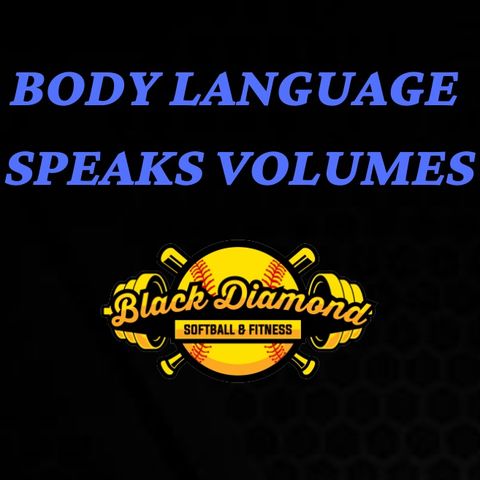Body Language Speaks Volumes

Scarica e ascolta ovunque
Scarica i tuoi episodi preferiti e goditi l'ascolto, ovunque tu sia! Iscriviti o accedi ora per ascoltare offline.
Descrizione
Number 1 Training Bat on the Market⬇️ Camwood Bats https://camwoodbats.com?a_aid=63d83ca5a0a57 You see it all the time, athletes slumped over, heads down, emotions visible all over their faces. Bad body language...
mostra di piùCamwood Bats
https://camwoodbats.com?a_aid=63d83ca5a0a57
You see it all the time, athletes slumped over, heads down, emotions visible all over their faces. Bad body language has become a serious problem for high school and college athletes these days. And while athletes’ body language isn’t always negative, negativity stands out the most. Deion Sanders once said, “If you look good you feel good, if you feel good you play good…” This quote is a perfect example of the impact body language can have on an athlete. It doesn’t matter what the score is, spectators or competitors shouldn’t know who’s in the lead before they look at the scoreboard. Having positive body language helps athletes focus and improve their mental game. Also, an athlete’s mental toughness can be what elevates them from being good to elite.
Nonverbal Behavior: Look the Part “Fake it ‘til you make it” is a good way for athletes to keep working on their body language and mentality. Dr. Amy Cuddy, an expert in body language at Harvard Business School, conducted a study on whether or not people could fake it till they made it. From her research, she found that our bodies can change our minds, which can change our behavior and ultimately modify the outcome.“All kinds of outcomes are determined by nonverbal behaviors,” Cuddy said. “If you tweak your nonverbal behaviors in simple ways, in a short period of time, it’s going to make you feel more powerful through physiological changes in your body.”In her study, she had people spend two minutes doing what she calls a high-power pose. Then they spent another two minutes doing a low-power pose. A high-power pose, by Cuddy’s definition, is a big, open, expansive stance. An example she refers to is Usain Bolt. When he wins a race, he opens his arms and reaches up to show pride and triumph. An example of a low-power pose is someone curled up, hunched over, and looking smaller than they are. After each experiment, they were instructed to fill out a survey, and give a saliva sample to see if the difference in body language had an impact on their behaviors. Can Your Body Language Change the Outcome? The answer: YES.“Just doing this before going into a room does change your performance,” Cuddy said. “Not only does it change your hormones, but it actually makes you perform better.”To test these findings, Cuddy put each subject’s power poses into action. She had them do two minutes of high and low-power poses before a videotaped job interview. The results prove that the subjects performed better and were more likely to be hired after doing their high-power pose.“If you pose like that and then you go in, you’re much more excited about what you’re doing, and that’s what’s coming across,” Cuddy said. “The content doesn’t matter. What you’re saying doesn’t matter.“If you believe in your idea and you can communicate that, that’s what matters.”This approach proves the science behind body language and how it can help people with their performance. Being a winner is something all athletes strive to be. So, if being a winner is the result you want, and body language can affect outcomes, spend two minutes before a game, practice, match, meet, competition, or whatever else, doing a power pose.
Mental toughness is the hardest part of being an elite athlete. Lots of athletes have the skills to be successful, but what stops them from reaching their potential is often their minds. Sometimes being in a rut or a routine can cause athletes to become comfortable. It’s not until they’re in an uncomfortable situation do problems occur. These types of situations are usually when an athlete starts to have problems. It’s not uncommon for athletes to struggle, but it becomes a problem when athletes don’t know how to get over the issue mentally. Retired Navy SEAL, David Goggins is arguably one of the best endurance athletes in the world. He has completed multiple ultramarathons and ultra triathlons – a race longer than 26.2 miles or for a long specified time. Goggins is also the only member of the U.S. Armed Forces to complete SEAL training, U.S. Army Ranger School, and Air Force tactical air controller training. It’s safe to say he knows a thing or two about mental toughness. Through all of Goggins's training, he finds that “Everybody is looking for mental toughness, every athlete, everybody in the world is looking for mental toughness. The only way you gain mental toughness is to do things you’re not happy doing. If you continue doing things that you’re satisfied with, and that make you happy, you’re not getting stronger. Either you’re getting better or worse, you’re not staying the same.”
Informazioni
| Autore | Tyler Black |
| Organizzazione | Tyler Black |
| Sito | - |
| Tag |
Copyright 2024 - Spreaker Inc. an iHeartMedia Company
